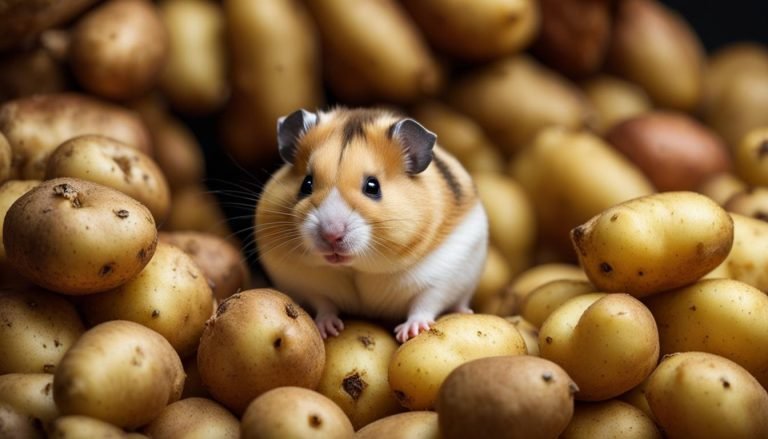Can Hamsters Eat Peaches? Safe Snacking Tips
Today, I want to talk about everyone’s favorite furry friends and their snacking habits. As responsible hamster owners, we need to know what foods are safe for our little companions. That leads us to the question – can hamsters eat peaches? Let’s find out!
When it comes to the diet of our adorable hamsters, it’s crucial to provide them with foods that promote their health and well-being. Feeding them the wrong foods can lead to various health issues. So, before we dive into the world of peaches and hamsters, let’s take a quick look at the kinds of foods they should avoid.
Some foods, like almonds and chocolate, can be harmful to our hamsters. However, there are also safe foods that hamsters can enjoy in moderation, such as well-washed fruits and vegetables, cereals and grains, and small amounts of lean chicken. It’s essential to closely monitor your hamster’s diet and consult a veterinarian if you notice any changes in their eating habits or health.
Key Takeaways:
- Peaches can be included as a part of your hamster’s diet as a treat.
- Always give fresh peaches and wash them thoroughly to remove any pesticides or bacteria.
- Avoid canned and frozen peaches, as they may contain added sugar.
- Provide peaches in small quantities to prevent health issues like obesity and diabetes.
- Remove uneaten pieces of peach from the cage within a few hours to maintain cleanliness.
Now that we know the importance of a balanced diet for our hamsters, let’s explore the world of peaches and see if our little friends can indulge in this juicy fruit. In the next section, we’ll dive deeper into what hamsters can eat and how peaches can fit into their diet.
What Can Hamsters Eat?
Hamsters require a diet that is rich in specific nutrients. A high-quality hamster food, also known as rodent blocks, is a good foundation for their diet. Brands like Oxbow offer quality hamster foods.
In addition to rodent blocks, hamsters can also enjoy small amounts of well-washed fruits and vegetables, such as blackberries, peaches, and mangoes. Cereals and grains, like whole wheat crackers and oats, can also be included in their diet.
It is important to provide these foods in small portions, less than a fingernail-size portion, and only a few times a week. This ensures that hamsters receive a balanced diet without overeating. By offering a variety of foods, hamsters can benefit from the different nutrients in each item.
When introducing new foods to your hamster, make sure to observe their reactions and monitor their health. Any changes in eating habits or health should be reported to a veterinarian for further evaluation. Remember, a healthy hamster diet consists of a mix of rodent blocks, fruits, vegetables, cereals, and grains.
Hamsters can enjoy small amounts of fruit as healthy snacks. They can eat peaches, but it is important to remember a few things. Fresh peaches should be given to hamsters, and they should be washed thoroughly to remove any pesticides or bacteria. Canned peaches, especially those packed in syrup, should be avoided due to their high sugar content. Frozen peaches may also have added sugar and should be used sparingly.
It is best to offer peaches in very small quantities, as the high sugar content can potentially lead to health issues like obesity and diabetes. Peaches should be given as occasional treats rather than regular dietary staples for hamsters.
By providing a balanced and varied diet, you can ensure the health and well-being of your furry friend. Always consult with a veterinarian if you have any concerns or questions about your hamster’s diet.
What Can’t Hamsters Eat?

While there are many safe foods that hamsters can enjoy, it is important to be aware of the foods that should be avoided. Feeding your hamster the wrong foods can have serious consequences for their health and well-being. Here are some foods that should not be included in your hamster’s diet:
- Almonds: Almonds are too high in fat and can cause digestive issues for hamsters.
- Celery stalks: Due to their stringy texture, celery stalks can be difficult for hamsters to chew and digest.
- Chocolate: Chocolate is toxic to hamsters, especially dark chocolate, as it contains theobromine, which can be fatal to them.
- Garlic: Garlic can irritate a hamster’s digestive system and cause stomach upset.
- Uncooked kidney beans: Raw kidney beans contain toxins that can be harmful to hamsters.
- Iceberg lettuce: Iceberg lettuce has limited nutritional value and can cause diarrhea in hamsters.
- Onions: Onions contain compounds that can damage a hamster’s red blood cells.
- Peanuts: Peanuts are high in fat and can lead to obesity and other health issues.
- Potato tops: The tops of potatoes contain solanine, a toxic substance for hamsters.
- Spicy or seasoned products: Spices and seasonings can be too harsh for hamsters’ sensitive digestive systems.
- Sugary products: Foods high in sugar, such as candy and sugary cereals, can cause obesity and dental problems in hamsters.
- Tomato leaves: Tomato leaves contain toxins that can be harmful to hamsters.
- Unwashed fruits or vegetables: Unwashed produce may contain pesticides or bacteria that can make hamsters sick.
These foods can be harmful to hamsters and may cause digestive issues, blood disorders, diarrhea, or other health problems. It is important to be vigilant and ensure that your hamster doesn’t have access to these foods. If you suspect that your hamster has consumed any of these foods or exhibits any unusual symptoms, consult a veterinarian immediately.
Can Hamsters Eat Peaches?
Yes, hamsters can eat peaches. Peaches are safe for hamsters to consume, but there are a few important considerations to keep in mind.
Fresh peaches should be given to hamsters, and they should be washed thoroughly to remove any pesticides or bacteria. Canned peaches, especially those packed in syrup, should be avoided due to their high sugar content. Frozen peaches may also have added sugar and should be used sparingly. Dried peaches are high in added sugar and can cause a sticky mess in your hamster’s environment.
Peaches should be given in very small quantities, as the high sugar content can potentially lead to health issues like obesity and diabetes. It is always best to consult with a veterinarian before introducing new foods to your hamster’s diet.
Feeding Peaches to Your Hamster
When it comes to feeding peaches to your hamster, moderation is key. Due to the high sugar content of peaches and the small size of hamsters, it’s important to offer them as a special treat rather than a regular part of their diet. To ensure the health and well-being of your furry friend, follow these guidelines:
- Choose fresh peaches: Fresh peaches are the best option for your hamster. Make sure to wash them thoroughly to remove any pesticides or bacteria that may be present.
- Portion control: For dwarf hamsters, which are more prone to obesity and diabetes, offer tiny, paw-sized pieces of fresh peach every two weeks. Larger hamster varieties, such as Roborovski and Syrian hamsters, can enjoy a small paw-sized piece of peach once a week.
- Prevent overfeeding: Overfeeding peaches can lead to various health issues in hamsters, including diarrhea, lethargy, and dental problems. Stick to the recommended serving sizes and avoid giving your hamster too much peach at once.
- Remove uneaten peaches promptly: To maintain a clean and hygienic environment for your hamster, remove any uneaten pieces of peach from their cage within a few hours. This helps prevent bacterial growth and keeps your hamster’s home safe and tidy.
Final Thoughts
Peaches can be a tasty treat for your hamster, but it’s important to offer them in moderation as part of a balanced diet. While hamsters can safely eat peaches, they should not be a dietary staple. Instead, there are specific hamster foods available that are formulated to meet their nutritional needs.
When feeding peaches to your furry friend, ensure they are fresh and thoroughly washed to remove any pesticides or bacteria. Avoid canned or frozen peaches, as they may contain added sugars that can be harmful to your hamster’s health. Dried peaches are also high in sugar and can cause messy issues in their cage.
Consulting with a veterinarian is crucial before introducing any new foods to your hamster’s diet, particularly if they have existing medical conditions. Understanding the appropriate foods for your hamster and feeding them a well-balanced diet is key to ensuring their overall health and happiness.
Similar Posts
- Can Hamsters Eat Cilantro? Safe Herb Guide
- Can Hamsters Eat Cantaloupe? Find Out
- Can Hamsters Eat Avocado? Diet Safety Tips
- Can Hamsters Eat Pineapple? Safe Snack Guide
- Can Hamsters Eat Green Beans? A Complete Guide
- Can Hamsters Eat Blackberries? Safe Treat Tips
- Can Hamsters Eat Popcorn? Safe Snack Tips
- Can Hamsters Eat Salami? Here’s Why Vets Say No







